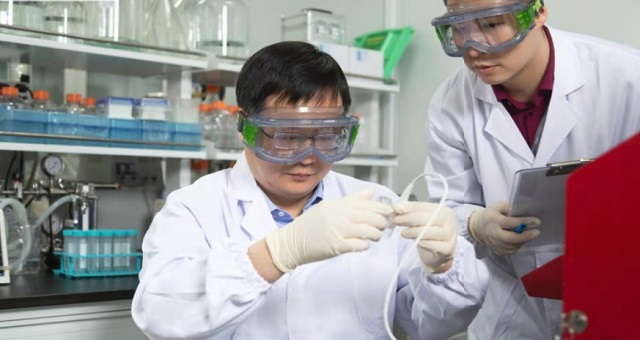
Convidecia Air utilises a nebuliser to change liquid into an aerosol for inhaling through the mouth
| THE INDEPENDENT | The National Medical Products Administration of China (NMPA) has approved CanSino Biologics’ (CanSinoBIO) recombinant Covid-19 vaccine (Adenovirus Type 5 Vector) for inhalation, Convidecia Air, as a booster.
This vaccine leverages the same adenovirus vector technological platform as Convidecia, the intramuscular version.
Providing a non-invasive option, Convidecia Air utilises a nebuliser to convert liquid into an aerosol for inhaling through the mouth, the company noted.
The needle-free vaccine can also elicit complete immune protection against the SARS-CoV-2 virus after just a single inhalation.
In March last year, CanSinoBIO obtained approval for the clinical trial application to analyse Convidecia Air. The vaccine was developed in partnership with the Beijing Institute of Biotechnology (BIB).
According to studies, Convidecia Air could prompt robust cellular, humoral and mucosal immunity to attain triple protection as well as control the virus spread and the infection.
The company has presently attained steady manufacturing of several innovative vaccines and set up a supply chain worldwide to increase accessibility to quality vaccine products for people globally.
Inhalable vaccine in trials
An inhalable version of a single-shot, adenovirus-based viral vector vaccine might provide a new option for COVID-19 vaccination.
In October 2021, the World Health Organisation set a target for countries to vaccinate 70% of their populations against COVID-19 by mid-2022. However, improving vaccine access and delivery to the more than 90% of people from lower-income countries who remain unvaccinated, remains a challenge.
Researchers racing to lower the logistical and cost barriers of vaccination suggest that developing inhalable vaccines may be one possible way forward.
Compared to intramuscular vaccines, which usually require low-temperature storage and trained health personnel to administer them, inhalable vaccines can be administered through disposable devices, with minimal storage requirements for mass vaccination.
Inhalable vaccines may also induce a localised immune response targeting the mucosal surfaces where pathogens enter, instead of a systematic immune response, without specifically targeting the pathogen’s region of infection, as intramuscular vaccines do.
This specificity also means that only a lower dose might be needed compared to intramuscular injections.
New routes of administration
In 2021, Tianjin-based biopharmaceutical company, CanSino Biologics (CanSinoBIO) completed a Phase III clinical trial of their intramuscular COVID-19 vaccine, which involved 45,000 volunteers globally. The vaccine was subsequently approved for use in China, Hungary, Pakistan, Malaysia, Argentina, and Mexico. CanSinoBIO leads the development of an inhalable version of the vaccine.
CanSinoBIO’s vaccine is a recombinant viral vector vaccine, a class of vaccines that use a modified version of a different virus to deliver instructions to cells that trigger an immune response.
The viral vector derived from adenovirus, which infects cells readily but does not cause disease onset, serves as a carrier that delivers genetic materials that code for the SARS-CoV-2 spike protein to the cells.
Once it has entered a cell, the gene is transcribed to express the spike protein, which in turn serves as an antigen that stimulates the immune system to recognise the COVID-19 virus.
Zhu says the inhalable vaccine imitates the way COVID-19 enters human bodies via the airways. When CanSinoBIO’s vaccine is aerosolised into tiny particles, it can then be inhaled into the respiratory tract and lungs to trigger immunological memory and initiate an immune response in the mucous membranes in the respiratory tract.
When producing the inhalable vaccine, CanSinoBIO removes genes related to virus replication from the Adenovirus Type 5 Vector, so that the vector is replication-defective in human bodies. A gene sequence encoding the SARS-CoV-2 spike protein (S protein) is inserted at that location.
CanSinoBIO has previously used an adenovirus vector technological platform to develop a recombinant Ebola vaccine, as well as a tuberculosis booster vaccine, and zoster vaccine.
Accelerating production potential
After comparing a variety of atomisation inhalation devices on the market, CanSinoBIO has chosen a vibrating mesh nebulizer from the Galway-headquartered company, Aerogen, for their vaccine that produces droplets of two to five micrometres in diameter and has the least impact on the activity and structure of the vaccine.
Zhu’s team says the inhalable vaccine requires only one fifth of the dosage of an intramuscular one, which can help the vaccine manufacturer preserve more doses and boost its production capacity.
CanSinoBIO’s vaccine can also be stored and transported in refrigerator facilities at 2°C to 8°C, which is more favourable in countries with insufficient storage facilities and medical resources.
To establish a large-scale production process for the inhalable vaccine, Zhu says the challenge lies in comparing the different cell culture methods, with the team eventually deciding that perfusion culture was the best fit. Perfusion culture enables greater automation with fewer manual operations, while ensuring production quality, stability and flexible capacity, which enables an increase in production without a significant increase in manufacturing space.
“Another challenge we have had is to get the regulatory bodies to accept a vaccination programme for sequential inhalation vaccines,” says Zhu.
The company is also exploring the possibility of using their vaccine as a heterologous booster dose.
CanSinoBIO aims to continue to develop COVID-19 Variants of Concern (VOCs) vaccines and other inhalation vaccines.
“The aerosolized version of our vaccine provides early evidence of stimulating humoral, cellular and mucosal immunity,” says Zhu.
****
 The Independent Uganda: You get the Truth we Pay the Price
The Independent Uganda: You get the Truth we Pay the Price





